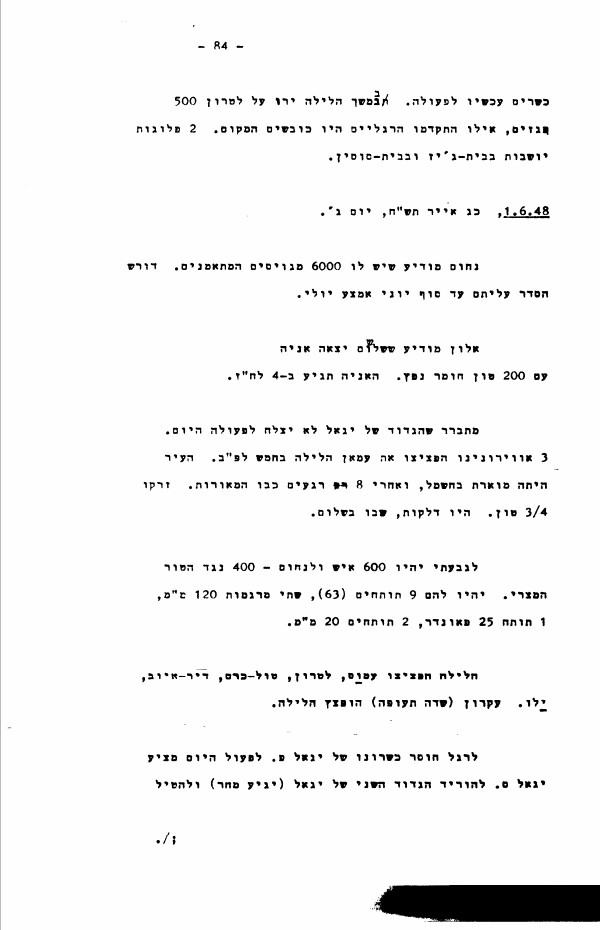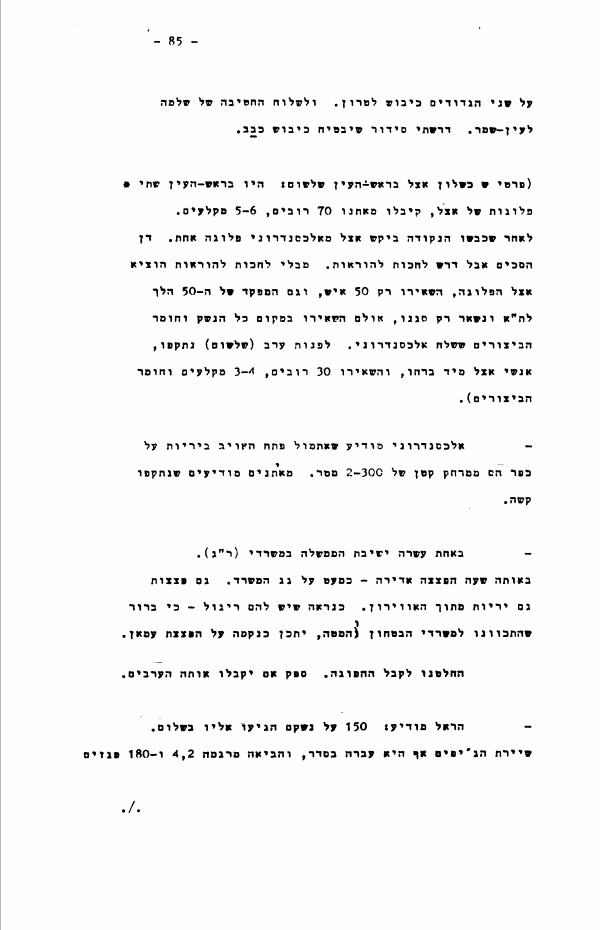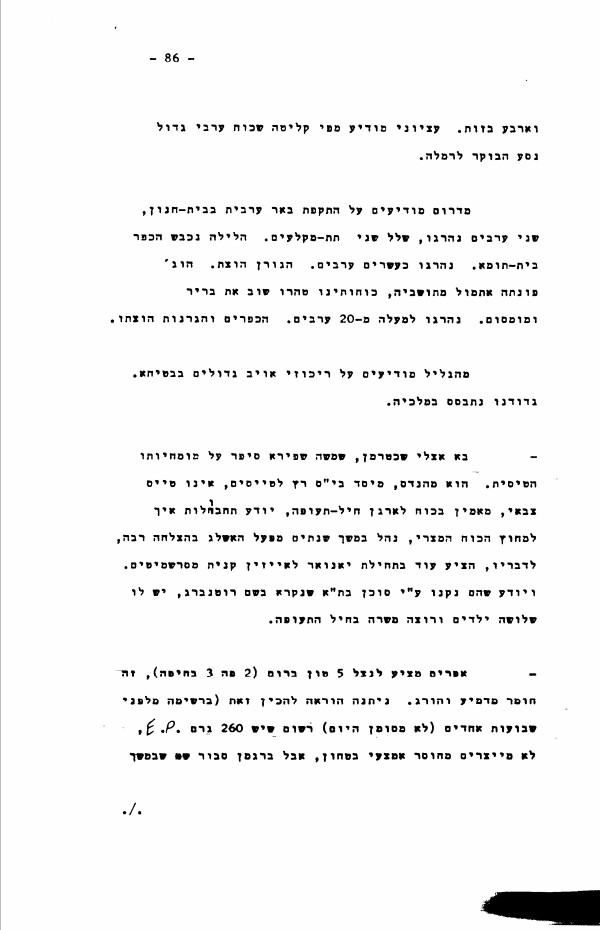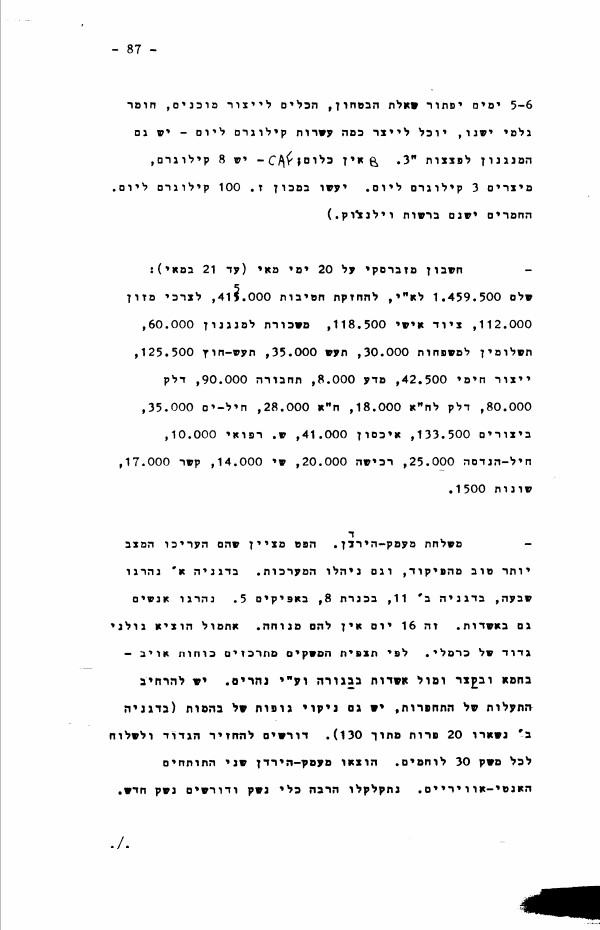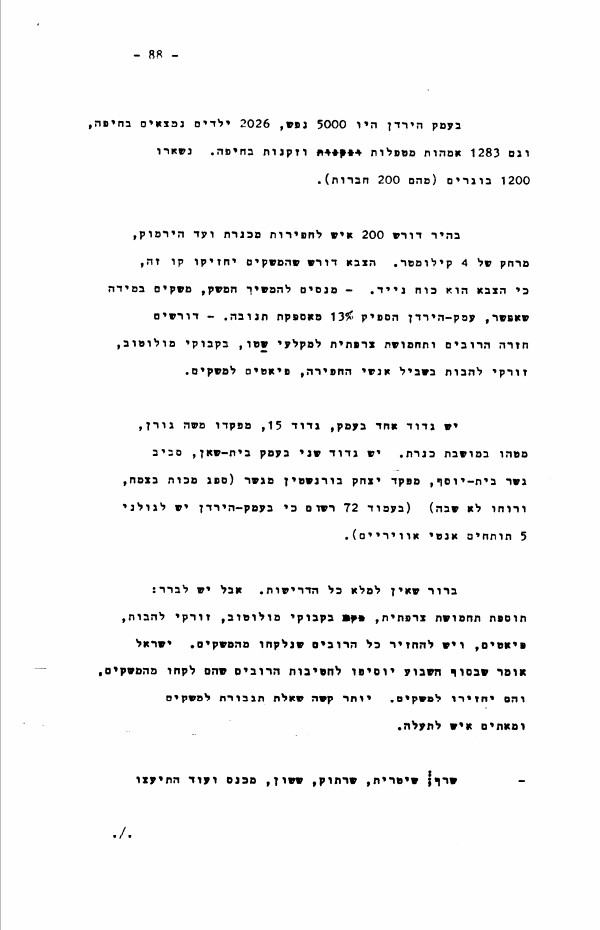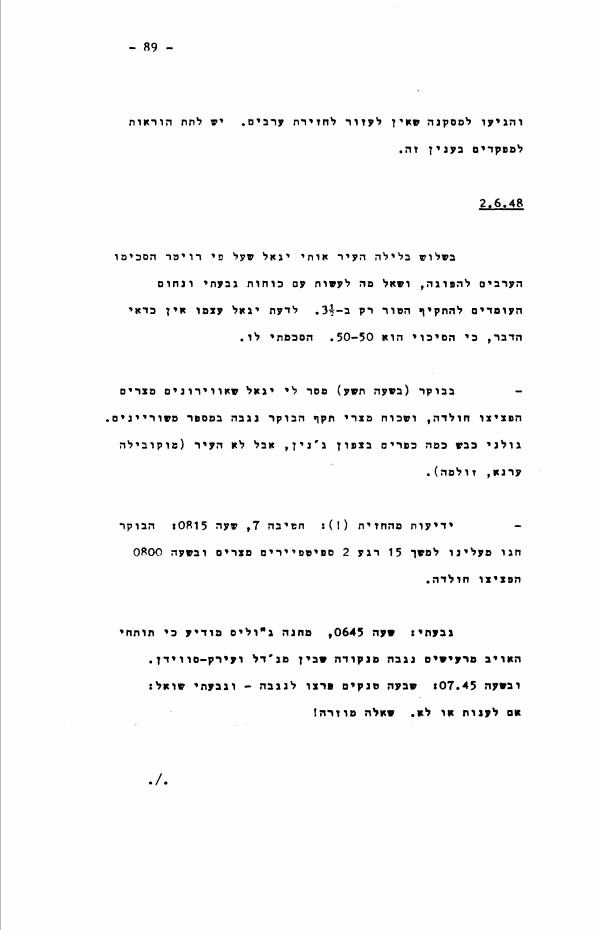Tuesday, June 1, 1948
Nahum [Shadmi] reports that he has 6,000 recruits in training [in Europe]. He's requesting that arrangements be made for their immigration by late June - mid-July.
Alon [Arazi] reports that two days ago the ship Montechiaro departed with 200 tons of explosives. It will arrive on the 4th of this month.
Turns out that the battalion under Yigal [Allon, of the Yiftah Brigade] won't be able to mobilize today.
3 of our planes bombed Amman at five this morning. The city was lit up with electricity, and after 8 minutes went dark. They tossed ¾ ton. There were fires. They returned safely.
Givati will have 600 men and Nahum [Sarig] - 400 against the Egyptian column [in Ashdod]. They will have 9 (65 mm) cannons, two 120 mm mortars, one 25-pounder cannon, two 20 mm cannons.
During the night [we] bombed Imwas, Latrun, Tulkarm, Deir Ayyub, Yalu.
Ekron (airfield) was bombed tonight.
In light of Yigal P. [Allon]'s incapacity to mobilize today, Yigael S. [Yadin] proposes that [we] summon Yigal's second battalion (which will arrive tomorrow) and order the two battalions to conquer Latrun, and that [we] send Shlomo's brigade [the 7th Brigade] to ''Ein Shemer [to reorganize]. I demanded an arrangement that would ensure the conquest of [Al-]Qubab.
(Details of the IZL failure in Rosh Ha'Ayin two days ago: There were two IZL companies in Rosh Ha'Ayin. They received 70 rifles, 5-6 [light] machine guns from us. After they conquered the settlement, the IZL requested one company from Alexandroni. Dan [Even] agreed, but insisted on waiting for instructions. Without waiting for instructions, the IZL evacuated [its] company. They left only 50 men. The commander of these 50 also went to Tel Aviv, and only his deputy remained. But they left behind all the weapons and fortification material that Alexandroni had sent. As evening approached (two days ago) they were attacked. The IZL men fled immediately, leaving behind 20 rifles, 3-4 machine guns, and fortification material.)
Alexandroni reports that yesterday the enemy began shooting at Kefar Hess from a short distance of 200-300 meters. Eitanim [a group of settlements east of Kefar Hess and north of Tira] reports that they came under fierce attack.
- At eleven government meeting in the (Ramat Gan) offices. At the same time there was a fierce bombardment - almost hit the office roof. Both bombs and gunfire from inside the plane. Apparently they have intelligence - because it's clear that they intended to hit the defense and General Staff offices. Perhaps as revenge for bombing Amman.
We decided to accept the truce.
It's doubtful the Arabs will accept it.
- Harel reports: 150 [men] with their weapons reached him safely. The jeep convoy also managed fine, bringing a 4.2" mortar and 180 shells and four Besas. Etsiyyoni reports, according to a reception [interception], that a large Arab force drove to Ramle this morning.
There are reports from the south about an attack on an Arab well in Beit Hanoun [north of Gaza], two Arabs were killed, two submachine guns seized. During the night the village of Beit Tima [north of the Julis-Nir-Am road, west of the moshav Kochav] was conquered. About twenty Arabs were killed. The granary was set on fire. Huj [near Dorot] was cleared of its residents yesterday. Our forces mopped up again in Burayr and Sumsum [along the road to Nir-Am]. More than 20 Arabs were killed. The villages and granaries were set on fire.
From the Galilee there's news of large enemy concentrations in Butayha [near where the Jordan River flows into the Kinneret]. Our battalion will be based in Malkiyya.
- I was visited by [Avraham] Schechterman, whose expertise in flying I'd heard about from Moshe Shapira. He's an engineer, founder of the Katz pilots' school, not a military pilot, believes he is capable of organizing an air force, knows tricks for crushing the Egyptian force. He ran the Potash Company for two years, very successfully according to him. Back in early January he'd suggested to Isaac [Yehoshua Eshel] that [we] buy Messerschmitts and he knows that they were bought by an agent in Tel Aviv named Rutenberg. He has three children and wants a job [role] in the air force.
- Ephraim [Katzir] suggests we take advantage of five tons of bromine (2 here, 3 in Haifa). It's a tear-causing and lethal material. Instructions were issued to prepare it (a list from a few weeks ago (undated) notes that there are 260 g of E.P. They're not producing because they lack safeguards, but Bergmann is certain that he will resolve the question of safety within 5-6 days. The tools for production are ready, the raw material is available, they can produce a few dozen kilograms per day - there's also a mechanism for 3" bombs. B - there's none; CAF - there are 8 kilograms, they're producing 3 kg per day. The S. [Sieff] Institute will make 100 kg per day. The materials are in Vilenchik's possession.)
- Invoice from Zabrasky for 20 days in May (up to May 21): He paid P£ 1,459,500. For maintaining the brigades 415,000, for food 112,000, personal equipment 118,500, administration salaries 60,000, payments to families 30,000, Ta'as [domestic weapons manufacturing] 35,000, foreign weapons manufacturing 125,500, chemical production 42,500, science 8,000, transport 90,000, fuel 80,000, fuel for air force 18,000, air force 28,000, navy 35,000, fortifications 133,500, storage 41,000, medical services 10,000, engineering corps 25,000, procurement 20,000, SHAI [intelligence service] 14,000, signal 17,000, miscellaneous 1,500.
Delegation from the Jordan Valley: [Avraham] Haft [from Degania] notes that they assessed the situation better than the command did, and also oversaw the campaigns. In Degania Aleph seven were killed, in Degania Bet 11, in Kinneret 8, in Afikim 5. There were also casualties in Ashdot[-Ya'akov]. For 16 days now they've had no rest. Yesterday Golani removed a Carmeli battalion. According to the settlements' observation outpost, the enemy forces are concentrating in Hama [Al-Hamma] and Qasr [Tel Katzir] and opposite Ashdot[-Ya'akov], in Bagura [sp.] [across the Yarmuk] and near Naharayim. The trenches need to be widened. There's also [a need to] clear away animal carcasses (in Degania there remained 20 cows out of a [herd of] 130). They're calling for the battalion [that was removed] to be brought back, and for 30 fighters to be sent to each settlement. Two anti-air cannons were removed from the Jordan Valley. Many weapons were damaged and they're demanding new weapons.
There are 5,000 people in the Jordan Valley. 2,026 [evacuated] children are in Haifa, and 1,283 mothers, [children's] caregivers, and old women are also in Haifa. There remain 1,200 adults (200 of whom are [kibbutz] members).
[Aryeh] Bahir [from Afikim] is calling for 200 men to dig [trenches] from Kinneret to the Yarmuk, a distance of 4 km. The army is insisting that settlements hold this line because the army itself is a mobile force. They're trying to keep up with the farming [duties], watering [crops] to the extent possible. The Jordan Valley provided 13% of Tnuva [the national dairy company]'s provisions.
They're demanding that rifles be returned, and French ammunition for Chauchat machine guns, Molotov cocktails, flamethrowers for [trench] diggers, PIATs for the settlements.
There's one battalion in the Valley, Battalion 15 [from Golani], under the command of Moshe Goren, with headquarters in Moshavat Kinneret. A second battalion is in Bet She'an Valley, around Gesher - Bet Yosef, commanded by Yitzhak Bornstein [Broshi] from Gesher (it took a beating in Tsemah and its spirit hasn't returned) (the entry for May 30 notes that Golani has 5 anti-air cannons in the Jordan Valley).
Clearly not all the demands will be met. But we need to arrange: additional French ammunition, Molotov cocktails, flamethrowers, PIATs, and all the rifles that were taken from the settlements should be returned. Yisrael [Galili] says that this weekend they'll provide the brigades with rifles [to replace the ones] they took from the settlements, and return these to the settlements. The more difficult issue is the question of reinforcements for the settlements and 200 men for trench [excavations].
[Ze'ev] Sherf: [Bechor] Sheetrit, [Moshe] Shertok, [Eliahu] Sasson, [Gad] Meknes, and others deliberated and reached the conclusion that we should not facilitate Arabs returning [to places they abandoned]. Instructions should be issued to commanders in this regard.





